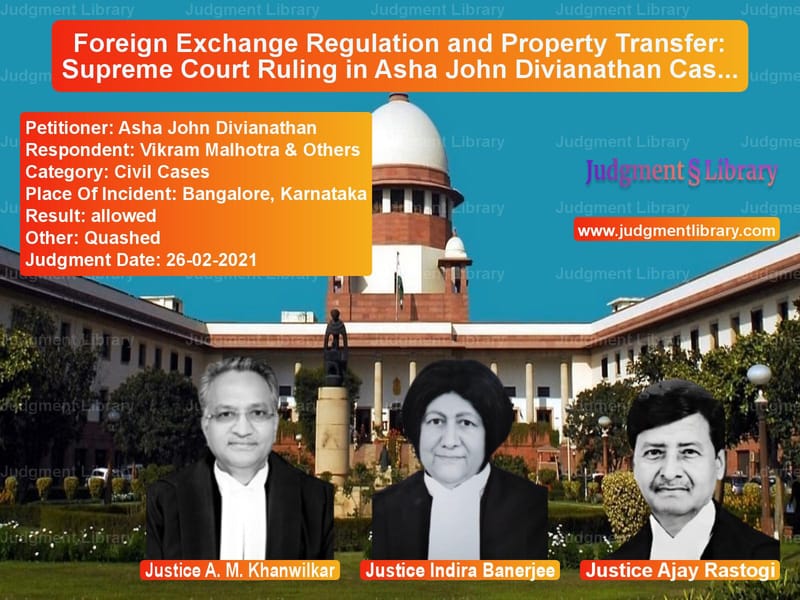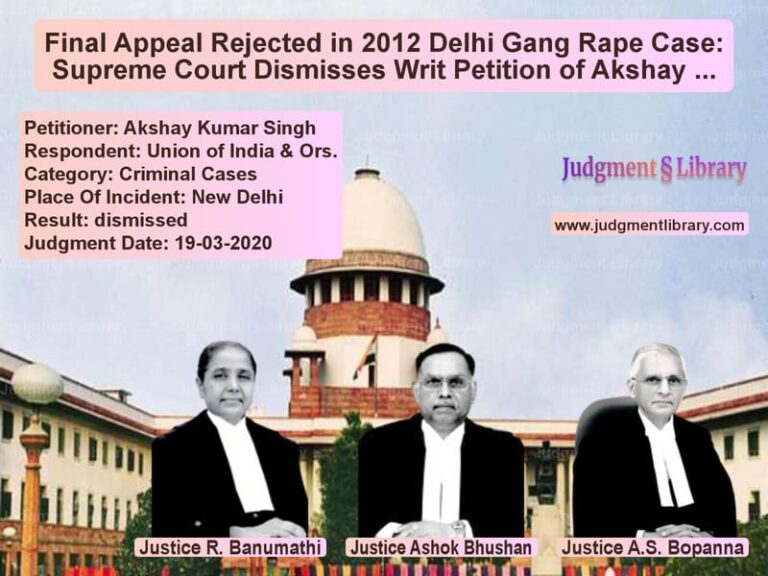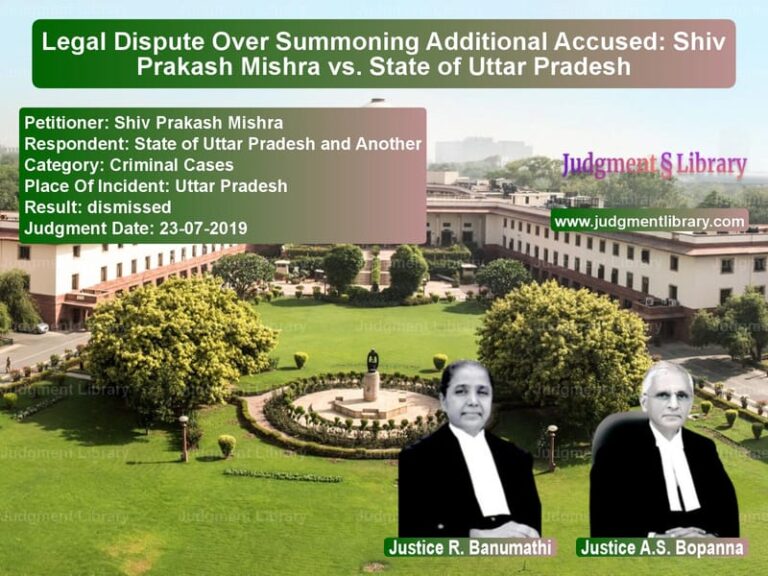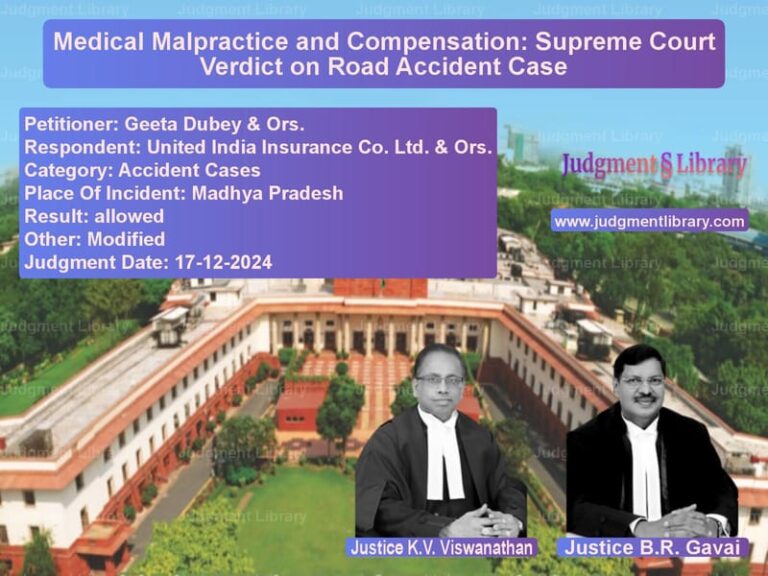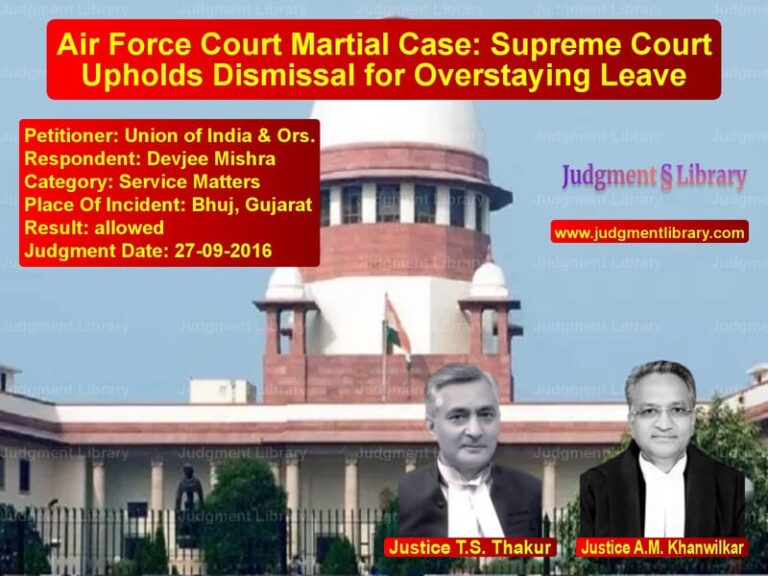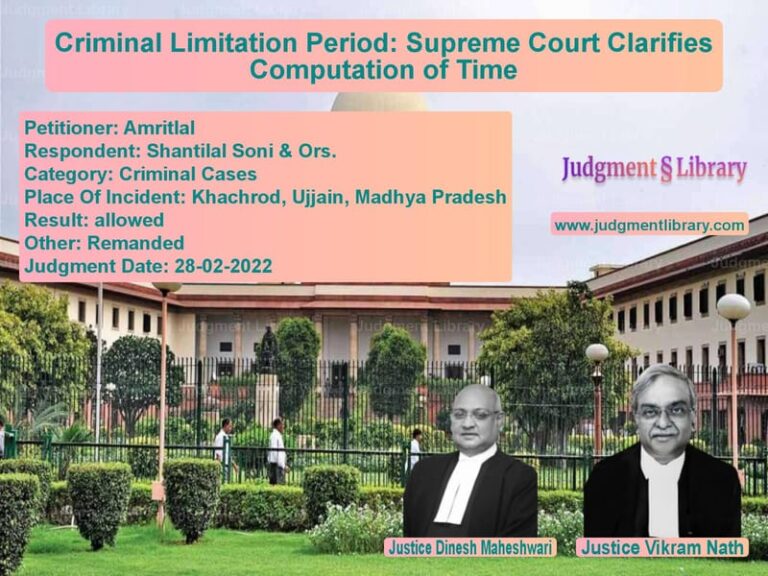Foreign Exchange Regulation and Property Transfer: Supreme Court Ruling in Asha John Divianathan Case
The case of Asha John Divianathan v. Vikram Malhotra & Others centers around the legality of property transactions involving foreign nationals under the Foreign Exchange Regulation Act, 1973 (FERA). The Supreme Court had to decide whether a property transfer executed without prior permission from the Reserve Bank of India (RBI) was void or merely voidable.
The dispute involved a property owned by a foreign national, Mrs. F.L. Raitt, who gifted a portion of the land to respondent Vikram Malhotra in 1977 and 1980 without obtaining prior RBI approval. Meanwhile, she had also entered into a sale agreement with Mr. R.P. David, the predecessor of the appellant, Asha John Divianathan, for the sale of the entire property. The RBI subsequently granted permission for the sale in 1983, and the sale deed was executed in favor of Mr. R.P. David. The appellant challenged the earlier gift deeds, arguing that they were unenforceable due to non-compliance with Section 31 of FERA.
Legal Issues Before the Supreme Court
The Supreme Court had to address the following key issues:
- Whether a property transfer by a foreign national without prior RBI approval under Section 31 of FERA is void or merely voidable.
- Whether the appellant could challenge the gift deeds despite not being a direct party to the transaction.
- Whether transactions in contravention of FERA provisions can be given legal effect.
Arguments by the Petitioner (Asha John Divianathan)
The appellant argued that:
- Under Section 31 of FERA, a foreign national cannot transfer property in India without prior RBI approval. The gift deeds executed in 1977 and 1980 were therefore illegal and unenforceable.
- RBI approval for the sale to her predecessor, Mr. R.P. David, was obtained in 1983, making his title legally valid.
- Since the earlier transactions violated FERA, they should be treated as void and ineffective.
- Section 50 of FERA imposes penalties for non-compliance, implying that non-compliant transactions are prohibited.
- The Supreme Court should recognize the intent of the law, which is to regulate foreign ownership and prevent uncontrolled land transactions by non-citizens.
Arguments by the Respondent (Vikram Malhotra & Others)
The respondent countered with the following points:
- The lack of RBI permission does not automatically render a transaction void; at most, it makes it voidable, meaning it could be challenged only by the RBI.
- The appellant did not have standing to challenge the gift deeds, as she was not a direct party to them.
- There was no provision in FERA explicitly declaring that transactions made without RBI approval were void.
- The penal provisions in Section 50 of FERA only imposed penalties but did not declare transactions illegal.
- Courts should not interfere in private contracts unless specifically mandated by law.
Supreme Court’s Analysis
The Supreme Court carefully examined the provisions of FERA and the intent of Section 31. It observed:
- Section 31 mandates prior RBI approval for property transfers involving foreign nationals. The provision was designed to regulate foreign investment in land and prevent unauthorized transactions.
- The law clearly requires permission before executing a transfer. The phrase “previous general or special permission” signifies that the approval must be obtained in advance.
- The absence of explicit language declaring such transactions void does not mean they are automatically valid. The law’s intent is to prevent unauthorized transactions, and non-compliant transactions are unenforceable.
- The fact that penalties exist under Section 50 for violations reinforces that such transactions are illegal.
Key Judicial Observations
The Court relied on the legislative intent of FERA and ruled:
“A contract is void if prohibited by a statute under a penalty, even without an express declaration that the contract is void, because such a penalty implies a prohibition.”
The Court also referred to earlier judgments stating that:
“When a statute imposes a prohibition, any action taken in violation of it is unenforceable, even if the statute does not explicitly declare it void.”
Final Judgment
The Supreme Court ruled:
- The gift deeds executed in 1977 and 1980 by Mrs. F.L. Raitt in favor of Vikram Malhotra were unenforceable since they lacked prior RBI approval.
- The sale deed executed in 1983 in favor of Mr. R.P. David was valid as it was backed by RBI approval.
- The appellant, as the legal heir of Mr. R.P. David, was entitled to possession of the entire property, including the portion covered by the invalidated gift deeds.
- The respondent could not claim ownership over the disputed property.
- The Court overruled contrary judgments from High Courts that had previously held such transactions to be merely voidable rather than void.
Legal Significance
This ruling has far-reaching implications:
- Mandatory RBI Approval: Any transfer of immovable property by a foreign national without prior RBI approval is unenforceable.
- Regulation of Foreign Property Ownership: The judgment reinforces the policy of controlling foreign ownership of land in India.
- Validity of Earlier Transactions: Only transactions that comply with RBI regulations will be upheld by courts.
- Precedent for Future Cases: Courts will treat similar unauthorized transactions as unenforceable in law.
This decision strengthens India’s regulatory framework for property transactions involving foreign nationals and upholds the necessity of RBI approval in such cases.
Petitioner Name: Asha John Divianathan.Respondent Name: Vikram Malhotra & Others.Judgment By: Justice A. M. Khanwilkar, Justice Indira Banerjee, Justice Ajay Rastogi.Place Of Incident: Bangalore, Karnataka.Judgment Date: 26-02-2021.
Don’t miss out on the full details! Download the complete judgment in PDF format below and gain valuable insights instantly!
Download Judgment: asha-john-divianatha-vs-vikram-malhotra-&-ot-supreme-court-of-india-judgment-dated-26-02-2021.pdf
Directly Download Judgment: Directly download this Judgment
See all petitions in Property Disputes
See all petitions in Contract Disputes
See all petitions in Judgment by A M Khanwilkar
See all petitions in Judgment by Indira Banerjee
See all petitions in Judgment by Ajay Rastogi
See all petitions in allowed
See all petitions in Quashed
See all petitions in supreme court of India judgments February 2021
See all petitions in 2021 judgments
See all posts in Civil Cases Category
See all allowed petitions in Civil Cases Category
See all Dismissed petitions in Civil Cases Category
See all partially allowed petitions in Civil Cases Category

